- Home
- Julianna Baggott
The Ever Breath Page 4
The Ever Breath Read online
Page 4
Truman held up his globe. The snow had settled. He and Camille peered at the miniature landscape inside. There was a large tent, its flaps billowing in the watery wind.
There was a young man in a blue hat who seemed to have stumbled backward and fallen on the ground beside a round cage that held a straggly dog. A woman with dark skin—dry and cracked, as if mud-caked—stood over him. She was dressed in a hooded cloak. On the ground between, there lay a knife, its hilt in the shape of a snake’s head with the flared feathers of a parrot.
“It’s like Grossbeak’s head, but on a snake,” Truman said.
“And look at his hat,” Camille said.
It was wooly, much like their grandmother’s hat. “That’s strange,” Truman said.
They both inched even closer to the globe. The man on the ground was wearing a white shirt, but it was turning red—a bright spot of blood was spreading across his white shirt!
Keep your eyes on those gifts, Truman heard his grandmother’s voice repeat in his head. Keep your eyes on them!
CHAPTER SEVEN
Into the Cold, Dark Night
Truman couldn’t sleep that night. The room shifted with strange shadows, and the narrow bed squeaked every time he moved. He lay on his side and stared at his snow globe sitting on the bedside table. Even now, just sitting there, it shimmered. Had the woman in the hooded cloak stabbed the man on the ground? What kind of grandmother gives a snow globe like that as a gift? My grandmother, Truman thought.
Camille was having no trouble at all sleeping. She was even snoring a little, cradling her snow globe like a football.
Truman always had trouble falling asleep. When he closed his eyes, his mind would be flooded with strange creatures—roaring, clawing, creeping, pouncing. His father called his imagination his blessing and his curse. But it seemed like just a curse to Truman.
In addition to the strange room with its strange noises and shadows and the eerie image in the snow globe, Truman was being kept up by his stomach. It was gurgling. He wasn’t sure how it was possible, but he was hungry. And he’d just eaten more than he ever had in his entire life!
As he tossed and turned, he only felt hungrier and hungrier. Eventually, at some point after midnight, it dawned on him that he hadn’t really eaten dinner. He’d tasted it! It had been a tasting tale! There were tons of food left over too, in all those containers. He put on his glasses, kicked off his blanket, and decided to go downstairs for a late-night snack.
He took the snow globe with him. He could stare at it while he ate—maybe he’d see something that made sense. He wanted desperately to connect the snow globe to the story Swelda had told.
He tiptoed out into the hallway and passed Swelda’s shut door. He could hear her snoring too, loudly. He was glad she was asleep. He was embarrassed by his pajamas—blue flannel with red buttons. Who had buttons on their pajamas anymore?
He ran his hand along the water-stained wallpaper—the dragonlike Chinese fighting dog—as he went down the stairs. The living room was dark, but he could see the dim shapes of the furniture, as well as the hall tree standing quietly by the door. It looked a bit drier than it had the day before.
When he stepped into the kitchen, he felt the wall for a light switch. He patted the spot where the light switch was at home, but there was nothing. He patted a bit more. Still nothing. And then, as if by magic, the overhead lights shone bright.
And there, claws gripped to the back of a chair, was Grossbeak. His perch was mounted on the wall right next to a light switch. The wall had a long, wide crack running all the way to the ceiling. Truman didn’t remember seeing it when he’d been in the kitchen the day before. Was it possible he hadn’t noticed a crack that big? Did it just appear, like a crack shooting through the ice on a frozen lake?
Truman looked at the crack and then the light switch and then the parrot. “Did you turn the lights on?” Truman asked, imagining him pecking it with his fat, curved beak.
Grossbeak bobbed his head.
“Did you just nod at me?” Truman asked.
Grossbeak bobbed his head again.
“You’re a smart bird, aren’t you?”
“Parrot, knucklehead!” Grossbeak squawked, correcting him.
“You know it’s not nice to call people knucklehead, right?”
Grossbeak bobbed his head. He knew all right. And then he added, “Knucklehead!”
Truman gave him a dirty look and walked to the fridge. He opened the door. The containers were stacked everywhere. Truman was delighted. He recalled, immediately, the tastes of the different foods, and with each remembered taste, a bit of the story swirled within him too. He remembered the strange dizziness of the tale, the way it felt inside him. He wanted that feeling back again.
And he realized that he wasn’t hungry for the food—or not just for the food. He was really hungry for more of the story.
Feeling greedy, he picked up a mini-tower of containers, turned around with his arms full, and shut the refrigerator door with an elbow. He set the containers on the table.
Grossbeak glared at him, flaring his head feathers.
“What?” Truman asked, innocently. “I’m just getting a snack, that’s all.”
The parrot shook his head.
“Do you have a problem with that?” Truman asked, spreading the containers around on the table, trying to decide which one to open first.
Grossbeak nodded. His scaly feet paced back and forth on the back of the chair.
“Too bad,” Truman said.
But when Truman pulled up the corner of a lid, the bird squawked viciously and beat his wings, lifting his body off the chair. He flapped in a circle over Truman’s head.
“Hey!” Truman shouted, covering his head with his arms. “Stop it!”
But the parrot only became more vicious, snapping his beak and squawking. He flew up toward the ceiling again, but this time he dive-bombed.
Truman grabbed his snow globe and took off running. He sprinted one lap around the tiny kitchen, the parrot flapping wildly behind him, and then darted into the dark living room.
Truman stumbled. Everything went quiet for a moment. He thought he might be able to hide here. The bird seemed to have disappeared into the shadows.
But suddenly, in a gusty flap of wings, he was there again, right in front of Truman’s face, snapping his beak as if he were testing the amount of force it would take to peck a boy to death. His wings stirred a breeze so strong that it rippled Truman’s hair and shirt.
Truman darted behind furniture and curtains. “Back off!” he shouted. He knew his sister would sleep right through all of his yelling. Was Swelda the same? Could anyone hear him?
He dodged and parried, and eventually he wound up near the front door. The bird blocked him in, massive wings beating, plumage flared. Truman saw no way to escape him—except through the front door, out into the night.
Truman struggled with the lock and the doorknob, but at last the door swung open. Truman slammed it shut behind him.
It was dark outside, except for a distant floodlight on the golf course. It had started to snow. The scene was dusted in white, much like the one in the snow globe that Truman still had tucked under one arm.
Barefoot and wearing only his pajamas, Truman stood on the front stoop, wondering how he’d get back inside, past Grossbeak, to his bed. And then he heard a pecking noise on the other side of the door, and a click.
“Grossbeak?” he said.
Truman turned the knob.
The door was locked.
CHAPTER EIGHT
Through the Passageway
Truman hugged the snow globe to his chest and tried to wrap his arms around himself to keep warm. He started hopping from foot to foot to keep the snow from stinging his bare feet. The snow was coming down fast. The flakes were heavy and fat, and the fog was so thick that Truman could see only a few feet in front of his nose. Everything was white. His glasses fogged up too, so it was like trying to see a cloud throu
gh a cloud. He pulled them off and wiped them on his pajama top, but as soon as he put them back on they fogged up again.
He wondered if he should pound on the door and call for help. But would Swelda and Camille even wake up? Or would this just rile Grossbeak?
Truman remembered the lost golf balls he’d seen earlier. He could dig for some golf balls in the grass and throw them at the boarded-up windows. It was all he could think of, and he had to try something. He couldn’t stay out here all night!
As he walked down the brick steps, he felt the edges crumble just a bit beneath his feet. Was the house about to collapse?
He tiptoed through the snow to the deep grass near the bushes where he’d seen golf balls earlier. The grass was stiff with cold.
Then he heard a small cry. It rose up in the night air. Two sad notes: mewl-mewl. Like a cat, but not quite. The voice was sadder, more human.
“Mewl-mewl,” it cried again.
Truman remembered the shiny black tail of the cat he thought he’d seen in the bushes when they first arrived. Was the cat still lost out here in the cold?
“Here, kitty,” he called. “Here, kitty, kitty.”
The cat cried again, in that nearly human voice. Truman could see only white and the clouded outlines of the nearby bushes, the edge of the house. The cry sounded even farther away, like it was coming from the side yard. He followed the voice. “It’s going to be okay,” he called.
Truman kept one hand on the side of the house so as not to lose his bearings. The fog was rolling in even more heavily. Now he could see only a white mistiness.
“Mewl-mewl,” the cat cried. This time it sounded like it had turned another corner and was coming in from the backyard.
“I’m coming,” Truman called. “Stay still.” He’d decided that, even though he was allergic to pet dander, he’d pick the cat up and bring it inside—however he could get inside. Maybe it was a kitten that had gotten separated from its mother and was now lost in the freezing cold. He would heat up some milk and put it in a saucer.
Truman was in the backyard now, blinded by whiteness. He could see the small glowing cracks between the boards nailed over the windows in the kitchen. But that was all.
“Here, kitty, kitty, kitty,” he called again.
But there was no answer.
He turned in a circle, calling, “Here, kitty, kitty, kitty.”
Again, nothing.
His feet were so cold they felt like they were burning. His face stung. Would the water in his snow globe freeze out here and break the glass? He held on to the snow globe more tightly. He wasn’t sure what to do. Just then, Grossbeak must have pecked at the light switch in the kitchen, because the lit cracks between the boards went dark.
And all at once Truman felt like crying. He realized, for the first time, how alone he was—not just because his father had disappeared and not just because his mother had left him here. Not just because his sister and grandmother couldn’t hear him. No. He felt really and truly alone in the world. Lost and alone.
But then he heard the warbled cry of the cat, one more time. “Mewl-mewl.” It sounded muffled, like it was coming from somewhere in the house. That was when Truman remembered the root cellar—the place where Swelda made her browsenberry wine.
One hand holding the snow globe, he held the other out in front of his face and walked, blindly, toward the sound of the cat’s cry. He padded the snow with one outstretched foot before taking each step. And finally his toe felt the stiff lip of the root cellar door, which thankfully was propped open. He quickly walked down the steps: the first step, the second step—and then there was nothing there, only air where a step should be. He landed so hard on the dirt floor that the wind was knocked out of him. He remembered the missing third step that Swelda had warned him and Camille about. What if he had an asthma attack in here? His inhaler was inside his jeans pocket in the bedroom.
As he stood up, still trying to catch his breath, something brushed his face. He batted it away, but it swung back. He grabbed it and realized that it was a string. To a light? He pulled it.
A bare lightbulb dangling from the ceiling brightened the room.
Now he could see why it was called a root cellar. The dirt walls were entwined with roots, like thick ropes, knots, and bulbous joints. They curled all around the cellar, leading out from one specific spot—the base of a tree. The hall tree! Here was its base, living and breathing, inside his grandmother’s dark root cellar. A miracle of a tree.
There were also rows of bottles on shelves lining the walls and wide wooden barrels and kettles, crocks, strainers, and funnels—all for brewing browsenberry wine, he figured.
Truman walked over to a table in the middle of the room. It was covered with yeast sacks, gears, a bucket of corks, fine woven cloth, and tools he couldn’t name. In the corner, in large baskets, were the berries themselves—so pale they looked like small, bright full moons. Truman dipped his hand into a basket of the cool fruits. He could feel the soft prickle of their fine downy fur, soft as peach fuzz. He realized that he was breathing in calm, regular breaths.
And then the cry. “Mewl-mewl.”
He’d almost forgotten the cat! He looked around the edges of the root cellar and caught a glimpse of it darting along the far wall before it slipped into a hole dug in the dirt amid a network of vines.
Truman walked to the hole, got down on his knees, and tried to peer into the darkness. “Come on out!” he called. “I’ll keep you safe.”
He couldn’t see anything and so he reached into the hole, clutching the snow globe with his other arm. His hand slid down a steep and crumbling tunnel lined with bumpy roots.
“Where are you?” he whispered. “What kind of tunnel is this?” He let his arm follow his hand and then let his head—chin tucked—and his chest follow.
He heard the cat mewl, but now it sounded like she was saying “Follow, follow.”
Truman crawled down this strange, dark root-lined tunnel. The tunnel seemed to widen ever so slightly, but still he felt like he was being swallowed by the dirt. He thought back to the day before, when they were looking for his grandmother’s house. Swallow Road. He thought of Swelda’s tasting tale—the one he’d swallowed piece by piece. His heart raced in his chest. Would he be able to get back out of here?
It was too late to worry about that. The tunnel narrowed now, and he had to crawl on his elbows.
“Follow, follow,” he heard again.
The tunnel was tight, and the roots dug into his bony knees, but up ahead he saw something glowing.
He crawled more quickly.
It was a wine bottle glowing like a lamp. The label read “Swelda’s Browsenberry Wine.” Up ahead he saw another glowing bottle and then another and another. He kept following them on his belly through the dirt, until he heard mewling again. But it wasn’t just one voice. It was many voices, all mewling at the same time.
Then, without warning, the tunnel widened into a round room. The ceiling was suddenly tall enough for him to stand up. A tall root, straight as a post, shot up from the earth. It was encircled by glowing jars. The root was thin and delicate, with five thin offshoots that formed a hand: four long branchlike fingers and one thick thumb. It was poised as if it should be holding an apple up in the air. But it was empty. And the pinky on the hand looked brittle and was curling slightly inward, as if injured.
Truman stepped around the jars. Although the room was dug out of the earth and wrapped in roots, it seemed like a sacred place. Where was he?
He heard the cat’s human voice again: “Follow, follow.”
It was coming from the other side of the room, where the tunnel continued. Truman looked over his shoulder. He wanted to go back to the house, to his bed, to Camille’s snores. What good did his imagination ever do him? It got him in trouble during the day and it made it impossible to fall asleep at night. But, this very moment, he was imagining that there was something at the other end of the tunnel—something magical. He thou
ght of the Breath World in his grandmother’s tasting tale, and he could almost feel it calling to him from deep in the tunnel that lay in front of him. Was it real? And was this the way to it? He knew that if Camille were here she would say something like “Truman is afraid of the teacup ride at the amusement park. He’ll turn around any second now and come home.” But he wasn’t turning around. He wasn’t going home. He would follow the tunnel and see what was on the other end.
As he walked across the room, he stepped on something with his bare foot—something small and crisp, stiffer than a leaf, but not as hard as a bone. He shuddered and closed his eyes. He didn’t want to know what it was. He kept on going, and when he reached the mouth of the tunnel, he held tight to the snow globe and kept crawling forward.
The tunnel went on, and Truman wondered how long it was. What if it didn’t have an ending? He started to feel confined, a little claustrophobic. Was the tunnel getting tighter?
Finally, he saw a distant light. He crawled faster. His hand patted the dirt until he found one root and then another and another. He climbed the roots as if they were a ladder. And when he popped his head out of the tunnel, he saw two cat eyes, peering at him from a small, dimly lit room.
But it was not a cat—or not completely—because, as it reached forward to help him from the hole, it offered its pale little human hand.
CHAPTER NINE
The Breath World?
Truman stood in the small, dimly lit room. Everything was blurry, as if the room were underwater. There were strange catlike creatures weaving around his ankles, sniffing at the hems of his pajama pants, nosing his bare feet. There had to be a hundred of them at least. He was looking for the cat who’d led him here, an indistinct, furred black form, but now he couldn’t tell one from the next—and these obviously weren’t just cats. The creatures padded around on their back paws and human hands, and when they looked at Truman, they seemed to understand more than a cat would, though he wasn’t sure what made him think that, exactly. They were all making soft mewling noises in the backs of their throats.

 Burn
Burn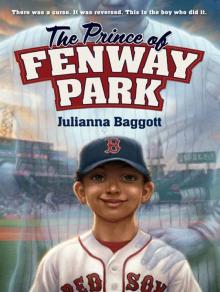 The Prince of Fenway Park
The Prince of Fenway Park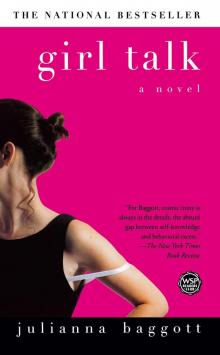 Girl Talk
Girl Talk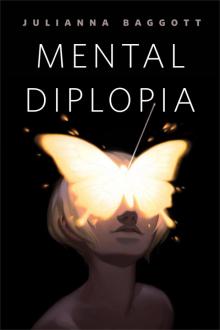 Mental Diplopia
Mental Diplopia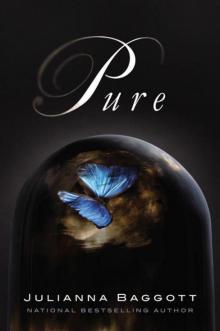 Pure
Pure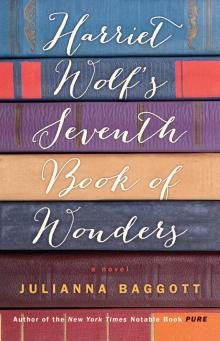 Harriet Wolf's Seventh Book of Wonders
Harriet Wolf's Seventh Book of Wonders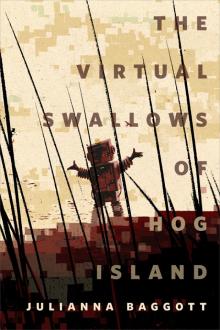 The Virtual Swallows of Hog Island
The Virtual Swallows of Hog Island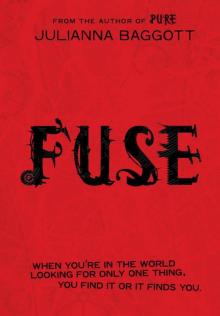 Fuse
Fuse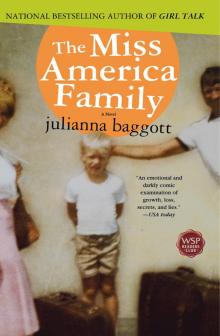 The Miss America Family
The Miss America Family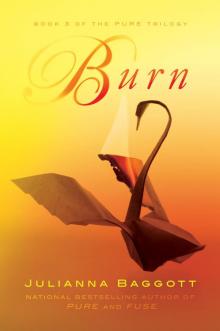 Burn (The Pure Trilogy)
Burn (The Pure Trilogy)